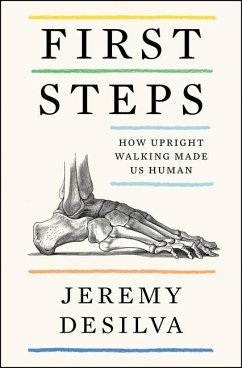Winner of the W.W. Howells Book Prize from the American Anthropological Association and named one of the best science books of 2021 by Science News ?DeSilva takes us on a brilliant, fun, and scientifically deep stroll through history, anatomy, and evolution, in order to illustrate the powerful story of how a particular mode of movement helped make us one of the most wonderful, dangerous and fascinating species on Earth.??Agustín Fuentes, Professor of Anthropology, Princeton University and author of Why We Believe: Evolution and the Human Way of Being ?Breezy popular science at its best. . . . Makes a compelling case overall.??Science News Blending history, science, and culture, a stunning and highly engaging evolutionary story exploring how walking on two legs allowed humans to become the planet's dominant species. Humans are the only mammals to walk on two, rather than four legs?a locomotion known as bipedalism. We strive to be upstanding citizens, honor those who stand tall and proud, and take a stand against injustices. We follow in each other's footsteps and celebrate a child's beginning to walk. But why, and how, exactly, did we take our first steps? And at what cost? Bipedalism has its drawbacks: giving birth is more difficult and dangerous; our running speed is much slower than other animals; and we suffer a variety of ailments, from hernias to sinus problems. In First Steps, paleoanthropologist Jeremy DeSilva explores how unusual and extraordinary this seemingly ordinary ability is. A seven-million-year journey to the very origins of the human lineage, First Steps shows how upright walking was a gateway to many of the other attributes that make us human?from our technological abilities, our thirst for exploration, our use of language?and may have laid the foundation for our species' traits of compassion, empathy, and altruism. Moving from developmental psychology labs to ancient fossil sites throughout Africa and Eurasia, DeSilva brings to life our adventure walking on two legs. Delving deeply into the story of our past and the new discoveries rewriting our understanding of human evolution, First Steps examines how walking upright helped us rise above all over species on this planet. First Steps includes an eight-page color photo insert.
Hinweis: Dieser Artikel kann nur an eine deutsche Lieferadresse ausgeliefert werden.
Hinweis: Dieser Artikel kann nur an eine deutsche Lieferadresse ausgeliefert werden.








